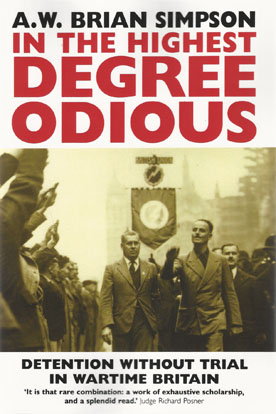
During the Second World War, just under 2000 British citizens were detained without charge, trial, or term set, under Regulation 18B of the wartime Defence Regulations.
Most of these detentions took place in the summer of 1940, soon after Winston Churchill became Prime Minister, when belief in the existence of a dangerous Fifth Column was widespread. Churchill, at first an enthusiast for vigorous use of the powers of executive detention, later came to lament the use of a power which was, in his words, in the highest degree odious.
This book provides a comprehensive study of Regulation 18B and its precursor in the First World War, Regulation 14B. Based on extensive use of primary sources, it describes the complex history of wartime executive detention: the purposes which it served, the administrative procedures and safeguards employed, the conflicts between the Home Office and the Security Service which surrounded its use, the part played by individuals, by Parliament, and by the courts in restraining abuse of executive power, and the effect of detention upon the lives of individuals concerned, very few of whom constituted any threat to national security. Much of what was done was kept secret at the time, and even today the authorities continue to refuse access to many of the papers which have escaped deliberate destruction.
This study is the first to attempt to penetrate the veil of secrecy and tell the story of the gravest invasion of civil liberty which has occurred in Britain this century.